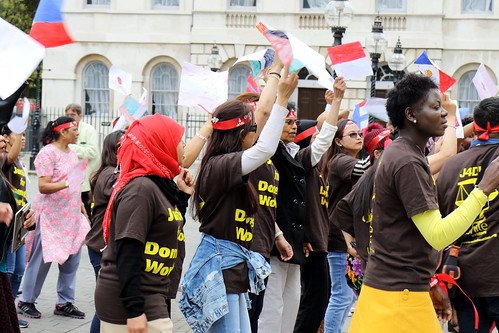Celebrate Domestic Workers, opposite the Parliament
Just half
an hour earlier, Noani Mukromin, one from the group, read a poem. The lines
talk about her children, the grief of having left them in Indonesia,
while here she is temporarily employed as an Overseas Domestic Worker.
That means
long hours spent within the same four walls - all these of the week, except for
Sunday -, little time to explore the city of London, little space for connect
with the family at home. But at the end of the month, she can send some money,
and they can so escape poverty, given more chances to live a better life.
 The story
goes more or less in the same way for many women in the UK, registered as
Overseas Domestic Workers.
The story
goes more or less in the same way for many women in the UK, registered as
Overseas Domestic Workers.16,756 were the successful applications for the related visa in 2014, according to the latest statistics by the Home Office.
Not really a different figure compared to 2008, when they were 16,659
And for the
years in the between, there has been quite a regular flow, despite the change
in the regulations and the rights of this work category.
International Domestic Workers Day
16 June 2011
marked the adoption of the Domestic Workers Convention, 2011 (No. 189) by the
International Labour Organization (ILO). For the first time, an international
treaty lays basic rights and principles of domestic workers, who contribute
significantly to the global economy, but also continue “to be undervalued and
invisible” – as the preamble to the Convention reads.
Interestingly,
this introduction to the document, also highlights the fact that domestic work
“is mainly carried out by women and girls, many of whom are migrants or members
of disadvantaged communities and who are particularly vulnerable to discrimination
in respect of conditions of employment and of work, and to other abuses of
human rights.”
The female
majority working in private households is a trait underlined also by Fiona
Mactaggart – Labour MP for Slough -, present at the Sunday celebration for the
International Domestic Workers Day organized in London.
Returning
to our sunny 17th of June, the reason why Justice 4 Domestic Workers, with One Billion Rising and guest speakers from the Unions, gathered in
front of the Parliament was not only to celebrate together International
Domestic Workers Day. But also to express once again the distress for
lack of recognition due of so many Overseas Domestic Workers.
(You can see these pictures in the Photo Gallery or on Flickr)
Some legal terms of ODWs
As
mentioned, there is a visa process to undergo for the migrant to reach the UK
as Domestic Workers.
From April 2012, the Overseas workers who accompanied their employers in the
UK, are not allowed to stay in the country for more than the fixed 6-months
term visa, if they want to change employers.
That means, when reported harassment, exploitation, or abuse by the employer, the worker can be granted at least 6 months of extended permit.
This would allow the proceeding of the investigation, in order to bring the wrongdoer to justice.
During this
time, the victim could also work under a different employer. But, as said, we
are talking about a victim, who should be recognized as such, which means that
the abuse needs to be reported to a competent authority.
According to the NationalReferral Mechanism (NRM), once the circumstances would have been investigated, the person is recognized as a ‘victim’, in reference to article 53 of the Modern Slavery Act 2015.
According to the NationalReferral Mechanism (NRM), once the circumstances would have been investigated, the person is recognized as a ‘victim’, in reference to article 53 of the Modern Slavery Act 2015.
What
conclusions this legislative overview bring us to? As reported by James Ewins
in his Independent Review of the Overseas Domestic Workers Visa (16 December
2015), domestic workers “often do not have knowledge of their legal rights” (29.5)
Exploited,
they run away, seeking refuge, maybe entering into illegal groups, not
reporting the abuse, or obliged to return to their country.
“It is
generally recognised that the UK woke up to the phenomenon of domestic violence
in the 1980s, yet even some 20 years later, Home Office statistics suggested
that only 35% of such abuse was being reported, and some research put the
figure as low as 23%" - the Independent Review reads.
Because of
the many unreported cases, there are not enough data for the government to
prove that the so called tied visa has given space for more abuses by the
employers.
Not alone
The day
offered the chance to hear see some dancing, here music, and listen to some of
the really difficult stories of these courageous women.
“Not only
you are the fire ignition of One Billions Rising, but you really hold up the
society in which you are working in the UK,” said Monique Wilson, Global
Director of One Billion Rising
“We will be
by your side – encouraged Diana Holland, Assistant General Secretary of Unitethe Union - beyond where we need to be, in front where we need to be, but most importantly
we will be alongside, all of us together, linking arms in solidarity,
protecting our democracy, and standing up for what is just and right.”


Comments
Post a Comment